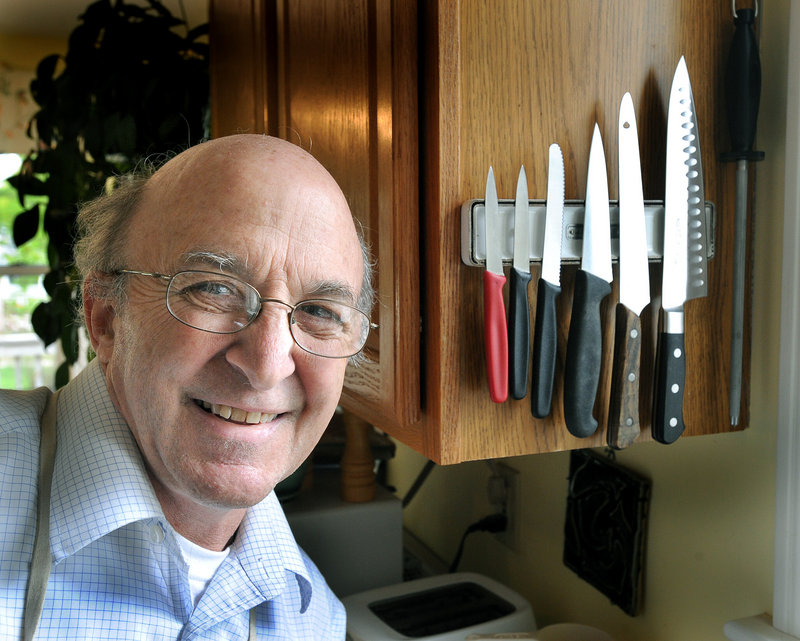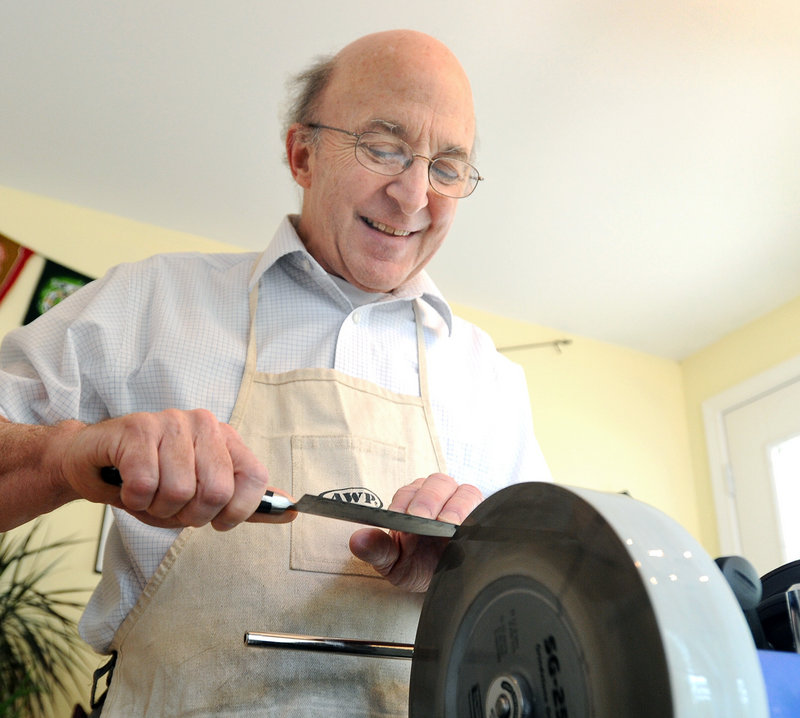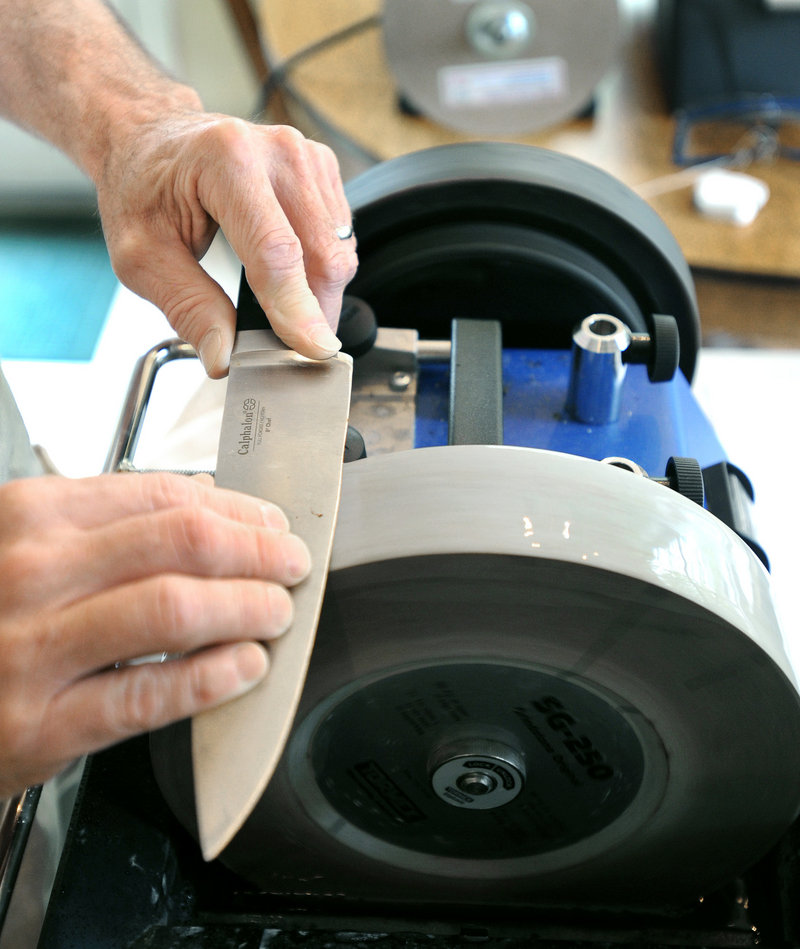When David Orbeton first started sharpening kitchen knives at the Brunswick Farmers Market this winter, he was just looking to build a little side business he could do in his spare time.
“People would bring one or two knives in, and I think they were testing me,” Orbeton said. “And then the following week they’d come in with (L.L.) Bean bags of knives, whole chef rolls. It was overwhelming. We actually had to turn people away.”
Orbeton, who is calling his new business Wicked Sharp, will be taking his wet grinder and diamond wheel to the Freeport Farmers Market beginning Friday, from 2 to 5:30 p.m. weekly on the L.L. Bean campus.
He’ll be at the Cumberland Center market on Tuttle Road from 9 a.m. to noon on Saturdays, biweekly beginning May 28. He’s also trying to get into the Portland Farmers Market, but estimates his chances at 50-50 because of the city’s regulations. And he’s trying to set up a rotating schedule at area kitchen stores.
It doesn’t appear he’ll be lacking for customers.
Some kitchen stores already offer knife sharpening services, usually on an irregular schedule that ranges from once a year to every three months or so. Freeport Knife Co. offers sharpening Monday through Saturday.
Still, the demand never seems to go away.
LeRoux Kitchen on Commercial Street hosts a representative from Wusthof every fall during Harvest on the Harbor so customers can get their knives sharpened in time for the holidays.
The events are so popular, the store started giving out numbers so people didn’t have to stand in line for too long — and even then, some people refused because they were worried about losing their spots.
“They’re popular,” LeRoux manager Suzie Rephan said. “We’ll keep two knife sharpeners busy for a full three hours.”
So how long has it been since you’ve sharpened your kitchen knives? And why have you waited so long?
“I think people are timid around their knives,” Rephan said. “First of all, they’re afraid to sharpen it incorrectly. They’re worried they’re going to ruin their knife. They also think that no sharpener is going to work” because their knives eventually get dull again.
Some experts say they should be sharpened professionally once a year; others say twice a year.
And, of course, it depends on what kind of knives you have, how often you use them and other factors.
“With sharpening, there are a lot of variables,” said Matt Cayer, who sharpens knives at the Freeport Knife Co.
“It can depend on the cutting surface that you’re using. Plastic and wood tend to be less damaging than a granite countertop or something like that. And it depends on how people are maintaining their knives between sharpenings.
“I’ve seen some people wait until the edge is completely rounded over, and then they say, ‘I can’t sharpen it.’ Well, no kidding, you can’t sharpen it. It needs to be reground.
“So there’s no good answer. If you feel your knife starting to drag a little bit, that’s when you need to touch it up.”
Why not just buy a home knife sharpener?
While there are some good knife sharpeners out there, Orbeton said, most of them simply don’t do the job that a professional sharpener can do.
“They really put a coarse edge on the knife,” he said. “If you were to look at the blade underneath a magnifying glass, it would be almost serrated. What happens is, the high points take all the wear on the knife, and because only a fraction of the knife is in contact with your food, it wears down a little quicker.”
Orbeton learned how to sharpen knives in the early 1970s, when he went to Europe to ski for a couple of months. It never snowed, so he got a job in a fancy hotel in Munich instead.
One of the chefs there taught him how to sharpen knives the traditional way, using a stone.
When he came home, he became a carpenter and cabinet maker, and sharpened all his own tools.
Today, he uses an $800 machine that he takes with him to all of his sharpening venues (more information on where to find him may be found at www.wickedsharpknives.com).
It is true what they say about a dull knife being more dangerous than a sharp one.
“Dull knives would be more prone to slip and cause an injury,” Cayer said.
“If it did come across your hand or something, a dull knife tears rather than cuts.”
Ouch.
Staff Writer Meredith Goad can be contacted at 791-6332 or at: mgoad@pressherald.com
Follow her on Twitter at: Twitter.com/MeredithGoad
Send questions/comments to the editors.






Success. Please wait for the page to reload. If the page does not reload within 5 seconds, please refresh the page.
Enter your email and password to access comments.
Hi, to comment on stories you must . This profile is in addition to your subscription and website login.
Already have a commenting profile? .
Invalid username/password.
Please check your email to confirm and complete your registration.
Only subscribers are eligible to post comments. Please subscribe or login first for digital access. Here’s why.
Use the form below to reset your password. When you've submitted your account email, we will send an email with a reset code.